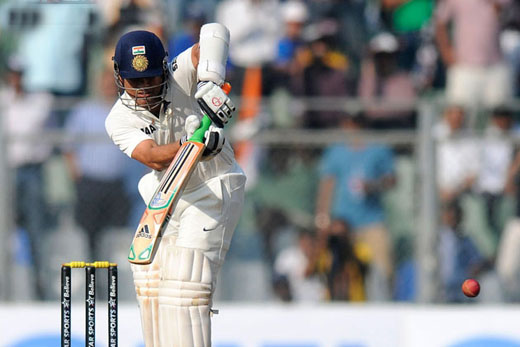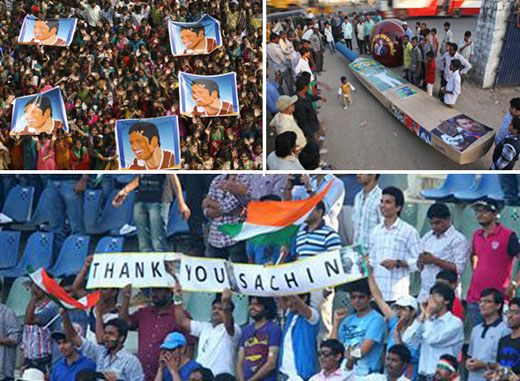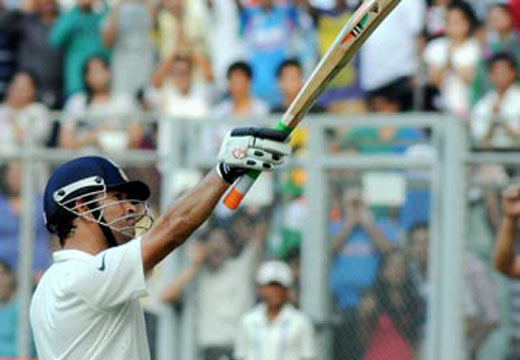Sachin Tendulkar: A billion reasons why the Master Blaster lives on
Sachin Tendulkar: A billion reasons why the Master Blaster lives on
mangaloretoday.com
Athletes come, athletes go. But Sachin Tendulkar will live on.Not on the cricket pitch. That part of his life, and ours, is ending. But in a billion-plus hearts and minds. In 24 years since he first wielded his bat for India, the so-called "Little Master," a giant of 5-foot-5 (1.65 meters), has been one of the finest ambassadors for the world’s second most populous nation, their fortunes inextricably linked.
As India tested nuclear weapons in the 1990s, Tendulkar stamped his mark on world cricket with his bold, confident strokes. Tormenting bowlers far bigger than him, from nations far wealthier and better resourced than his own, on all types of ground and in all conditions, Tendulkar seemed to embody the more assertive and ambitious country that India was becoming.

As the Indian economy took off - expanding more than five-fold in the three decades that Tendulkar has been completing his hostile takeover of cricket’s record books - he earned fabulous wealth, becoming one of the highest-paid athletes in any sport.
But television made and kept Tendulkar accessible to Indians. So did his humble demeanor. In a country of overlapping deities, competing religions and vast wealth gaps, where social tensions have frequently spilled over in blood, Indians could agree, as their T-shirts said on Thursday at his 200th and last test match, that "Sachin is God."
Adulation the man himself found tough to handle at times. Walking the teeming streets of Mumbai, where he was born, got his start in first-class cricket in 1988 and came full circle this week with the city hosting his swansong match, became "a little difficult," as Tendulkar so delicately put it. "There’s huge following. Where ever you go, people are around."

For snippets of peace and quiet, Tendulkar went for early morning drives. As much as they envied and gnashed teeth over Tendulkar’s skills - "I’ll be going to bed having nightmares of Sachin," said bowling great Shane Warne in 1998 after touring India with Australia - some fellow players acknowledged that they wouldn’t like to swap their lives for his.
Tendulkar was just a kid, a 16-year-old with a shock of curly hair, when he made his debut against rival Pakistan in 1989, a tumultuous year when the Berlin Wall fell and China’s communists slaughtered innocents around Tiananmen Square in Beijing.
When marveling at Tendulkar’s longevity, it’s hard to decide which is more astounding: that the 40-year-old was still thumping West Indies bowlers for four in his last match or that a man so reserved and measured has functioned so brilliantly, without sordid scandals often associated with money, fame and ego, under the microscope of 1.2 billion people - 350 million more than when Tendulkar debuted for India - for whom cricket isn’t just a sport but THE sport.
His timing was impeccable: not just with the bat, but also because his era coincided with and fuelled the monetization of cricket. His thumping strokes made for gripping television, both in the faster, more furious one-day format and in more patient five-day tests. He was the first batsman to score a double-century in one-day internationals. As with Michael Jordan for NBA fans or Diego Maradona in football, Tendulkar is one of those rare athletes whose otherworldly excellence, like love or a scar, permanently marks admirers.
"I will tell this for life: I was here today," said a fan’s banner at the Wankhede Stadium in Mumbai, illustrating the expectations Tendulkar has lived with. On Thursday, with fans’ chants of "Sachin! Sachin!" turning the stadium into a cauldron of noise, he looked freakishly calm as he walked to the crease, shyly acknowledging the West Indies players who formed two lines in a guard of honor and warming up by swinging his bat with its handle in the colors of the Indian flag: orange, white and green.

Tendulkar’s dozens of batting records - among them nearly all the big ones, including most runs and centuries in both tests and one-day internationals - flowed not only from his physical skills but also his steeliness. The only time he put a foot wrong on Thursday, despite what must have been almost intolerable pressure to perform and boiling emotions, was when he tripped slightly climbing the stadium stairs at the end of the day, after a seemingly nerveless 38 not out that means he will bat again on Friday.
Of all the millions of words devoted to Tendulkar, his former teammate Rahul Dravid said it best: "To bat for my life, I would probably choose Sachin."
For 1.2 billion reasons and more, Tendulkar’s retirement leaves a void that can never completely be filled. There are and always will be other great cricketers. But 99.9 percent of them will fall short against the benchmark that was Tendulkar.
New stars will come and go. But in 10, 20 or 30 years, cricket fans will still be saying: "You should have seen God."
- How Many Kratom Capsules Should You Take?
- ’Satan’s Last Stronghold’ - US Man wrote before death on Andaman Island
- Net neutrality debate rages on; expert panel report by mid-May
- Rich and Mighty Get Away Lightly for Rash Driving, Says Supreme Court
- US may be indirectly funding religious conversion in India
- India Once Again Awakens To Freedom
- RTI query results in Rs 1.87 cr recovery from toll operator
- How To Handle Cell phones and Your Children: Some Basic Advice
- D K Ravi’s Death No more Mistery
- Modi And The Paradox Of The Middle-Class Millennials
- As a Christian, suddenly I am a stranger in my own country, writes Julio Ribeiro
- Beef Ban: What Are The Cows Really Getting Out Of It?
- Malpe: Hotel gutted in fire mishap
- 99 sub-castes among Muslims, 57 in Christians: Karnataka Caste Census
- Mangaluru: Youth from Mumbai drowns in sea, another missing
- MP lays foundation for two road projects in Sullia taluk
- MCC workers to scan QR code via smartphones while collecting garbage
- Bantwal youth passes away in South Africa; final rites held in native village
- Double tie stuns Gurupura Kambala as buffalo pairs match speeds twice
- Newborn’s body found inside mosque premises in Malpe; police launch investigation
- Uppinangady: 13 injured as KSRTC bus crashes against divider
- Kasargod: Accused arrested in Manjeshwar auto driver murder; Revenge motive suspected
- Kasargod: Woman set on fire by harasser dies after week-long battle for life
- Udupi: 1 dead, another critical in collision between pick-up vehicle and bus
- Mangaluru: Woman, 3 year old son missing
- Patient dragged, beaten: Karnataka rehab centre spark outrage
- Two Naxals killed in Bastar encounter; AK-47 rifle, explosives recovered
- Court’s big order in MUDA site allotment case involving Siddaramaiah
- M K Stalin constitutes a committee to review Centre-State relations
- India’s Haj quota rises to 1.75 lakh in 2025, highest in a decade
- If you want son, you cannot...: Supreme Court tough on child trafficking
- Money laundering case: ED summons Robert Vadra in land deal
- Davanagere: Woman assaulted after husband complaints against her at Mosque
- Amid tears, Hubballi girl laid to rest; govt announces Rs 10L compensation to kin
- Many injured, police cars torched: Waqf protest in Bengal turns violent again
- Suspect in Bengaluru molestation case held from Kerala after massive police manhunt
- Who was Joy Saini, Indian-origin doctor killed in New York plane crash
- CITY INFORMATION
- TRAVEL
- TOURIST INFORMATION
- HEALTH CARE
- MISCELLANEOUS




 Write Comment
Write Comment E-Mail To a Friend
E-Mail To a Friend Facebook
Facebook Twitter
Twitter  Print
Print 


